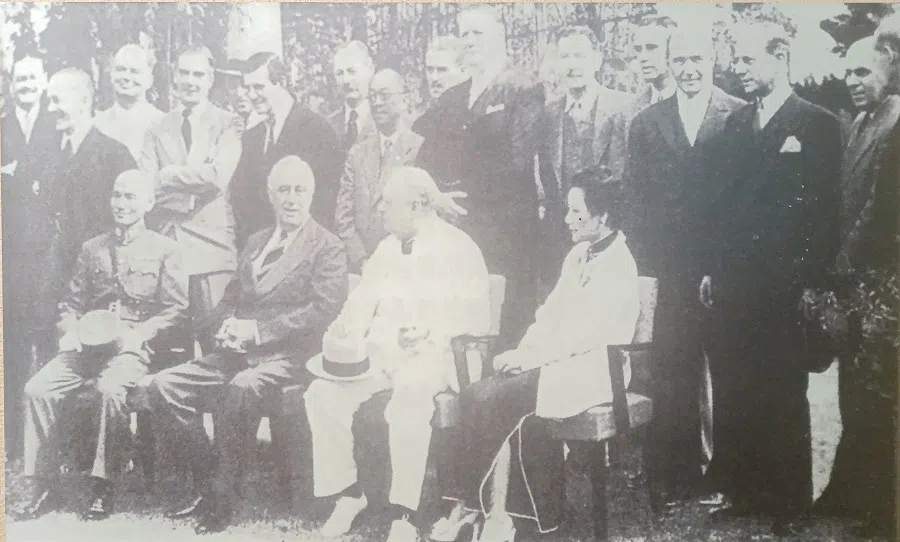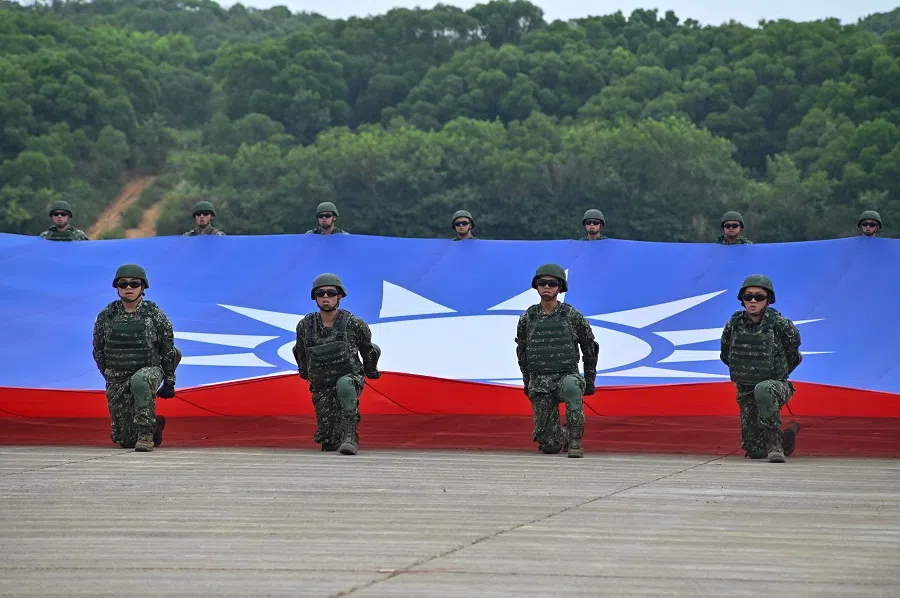Taiwan issue is one of politics, not jurisprudence
The Cairo Declaration issued 80 years ago became the basis of several international law documents and was backed by substantive procedures for the implementation of the related international laws. Academic Wang Weinan believes that the declaration carries a historical significance that should be considered even today amid the Taiwan issue.

The Cairo Declaration commemorated its 80th anniversary on 1 December 2023. General readers may not be familiar with this declaration, but those in academic circles studying the Taiwan issue and cross-strait relations, be it in mainland China or Taiwan, would know well the significance of this document.
Of course, academics who support Taiwan independence undoubtedly view the document as "evil" or insignificant. But the significance of this document is far from trivial judging from their distaste.
Legal declarations over Japanese territories
The year 1943 was a pivotal point in the Second World War. The anti-fascist alliance of the US, the UK, China and the Soviet Union scored many important victories in the European and Pacific theatres, including the Stalingrad victory and the toppling of fascist rule in Italy.
In late November 1943, the three leaders of the US, the UK and China met in Cairo, and discussed two key issues: their joint offence against Japan, as well as how to deal with Japan after the war.
In a joint declaration issued on 1 December 1943 which became known as the Cairo Declaration, the three countries stated, "The Three Great Allies are fighting this war to restrain and punish the aggression of Japan... It is their purpose that Japan shall be stripped of all the islands in the Pacific which she has seized or occupied since the beginning of the First World War in 1914, and that all the territories Japan has stolen from the Chinese, such as Manchuria, Formosa, and the Pescadores [Penghu Islands], shall be restored to the Republic of China."

At the time Japan had not yet lost, and the Cairo Declaration was only a one-sided stance adopted by the US, the UK and China, with no legal authority over Japan.
Two months had passed since fascist Germany surrendered and the war in Europe came to an end in July 1945; Japan was the only country among the Axis powers still mounting a stubborn resistance, but it was at the end of its tether.
On 17 July, the leaders of the US, the UK and the Soviet Union gathered in the small Berlin suburb of Potsdam to discuss pertinent matters in preparation for the plethora of political challenges that would arise following the end of the war in Europe. Even though the meeting's focus was not on battle plans against Japan, a draft initiated and written by the US and supported by the UK, who also invited China to be a part of it, was issued on 26 July. This was the Proclamation Defining Terms for Japanese Surrender, also known as the Potsdam Declaration.
It stated, "The terms of the Cairo Declaration shall be carried out and Japanese sovereignty shall be limited to the islands of Honshu, Hokkaido, Kyushu, Shikoku and such minor islands as we determine."
Indeed, the Potsdam Declaration was also a one-sided declaration issued by the Allied forces when Japan had not yet been defeated, and had no legal authority over Japan. However, on 14 August that year, the Japanese emperor announced his acceptance of the Potsdam Declaration in his surrender broadcast. On 2 September, in the Japanese Instrument of Surrender that was co-signed by nine countries including the US, China, the UK, the Soviet Union and France, Japan also pledged to accept the terms of the Potsdam Declaration.

Be it the surrender broadcast announced by the Japanese emperor, or the Instrument of Surrender jointly signed by Japan and the nine victorious countries, there is no doubt that the declaration is a legally binding document with immediate effect.
Thus, the Cairo and Potsdam Declarations were elevated from a one-sided declaration from the Allied forces, to a legal contract accepted by both sides who participated in the war, when taken in conjunction with the surrender broadcast and the Instrument of Surrender. The Cairo Declaration's status as an international legal document was thus cemented as such. It is not difficult to comprehend the logic behind this.
... the return of Taiwan and the Penghu Islands to mainland China is not only based on a series of international laws stipulated by the Cairo Declaration but also backed by substantive procedures for the implementation of these international laws.
Japan's surrender
On 25 October 1945, the Japanese held their surrender ceremony at the Taipei City Hall (present day Zhongshan Hall). With a representative from the Allied forces as witness, Chen Yi, then chief executive and garrison commander of Taiwan province appointed by the Chinese government, represented the Chinese in accepting the Japanese surrender.
He declared to the Japanese: "In accordance with the order of the Supreme Commander of Allied forces in the China Theatre and Chairman of the National Government of Republic of China, Chiang Kai-shek, and Commander-in-Chief He Yingqin, as well as various memoranda from Commander He to General Yasuji Okamura, this official and the troops and administrators designated by this official, shall accept the surrender of the Japanese army, navy and air force, and their auxiliary forces, in the area of Taiwan and the Penghu Islands; it shall also accept the territory, people, governing rights, military and political facilities and assets of Taiwan and the Penghu Islands."
The Japanese representative, Rikichi Ando, responded, "Today, we have received Order No. 1 from the Chief Executive and Garrison Commander of Taiwan province in the China Theatre, and we shall comply with the order. We will immediately instruct all relevant and representative political and military offices and officials across all levels to comply with the order."

Before the end of the ceremony, Chen declared, "From today onwards, Taiwan and the Penghu Islands shall officially be included under China's territory. All matters pertaining to the land, people and political affairs shall be under the governance of the National Government of the Republic of China. I would like to specially report to all my Chinese compatriots, as well as to the rest of the world, a fact of such historic significance."
As for the Treaty of San Francisco...it is in fact a "reversal" of a series of international law documents that began with the Cairo Declaration.
US's policy shift
It can be observed from the aforementioned historical facts that the return of Taiwan and the Penghu Islands to mainland China is not only based on a series of international laws stipulated by the Cairo Declaration but also backed by substantive procedures for the implementation of these international laws.
The Japanese surrender in Taipei on 25 October 1945 essentially functioned as a ceremony restoring China's sovereignty over Taiwan and the Penghu Islands. Due to its defeat, Japan accepted the Potsdam and Cairo Declarations, and implemented the provisions of the Cairo Declaration that returned Manchuria, Taiwan and the Penghu Islands to China.
As is the case with a man and a woman who are legally married and held a wedding ceremony, can the legality of their marriage be questioned? Back then, the Chinese Nationalist government designated 25 October as Retrocession Day, just as a married couple marks the day of their wedding as their anniversary - this is only reasonable.
As for the Treaty of San Francisco that the US gathered some of its allies (excluding China and the Soviet Union) to sign with Japan in 1951, which only required Japan to renounce its title to the island without designating a transferee, it is in fact a "reversal" of a series of international law documents that began with the Cairo Declaration.

The background was that the Cold War between the US and the Soviet Union was in full swing and that mainland China had changed hands, with the Chinese Communist Party forming an alliance with the Soviet Union.
... the US policy towards Taiwan shifted from recognising that Taiwan has been returned to China to "Taiwan's status is unsettled".
At the same time, after the Korean War broke out, the US realised the strategic importance of Taiwan, which must not be controlled by pro-Soviet, anti-American forces. Thus, the US policy towards Taiwan shifted from recognising that Taiwan has been returned to China to "Taiwan's status is unsettled". The change had nothing to do with international jurisprudence but everything to do with international politics.
Hence, the complexity of the Taiwan issue today does not lie in jurisprudence but in politics, which encompasses China-US and China-Japan relations, as well as cross-strait relations and even domestic politics on both sides of the Taiwan Strait. This is a wide-ranging issue that requires an article of its own.
Lastly, the Cairo Declaration also stipulates that "Japan shall be stripped of all the islands in the Pacific which she has seized or occupied since the beginning of the First World War in 1914". This naturally also includes Southeast Asian islands such as Singapore.
This article was first published in Lianhe Zaobao as "《开罗宣言》与台湾问题".




![[Big read] When the Arctic opens, what happens to Singapore?](https://cassette.sphdigital.com.sg/image/thinkchina/da65edebca34645c711c55e83e9877109b3c53847ebb1305573974651df1d13a)
